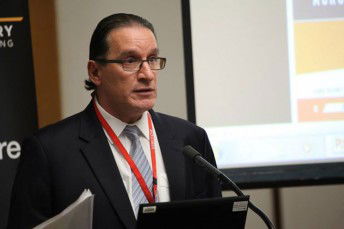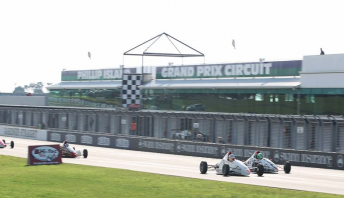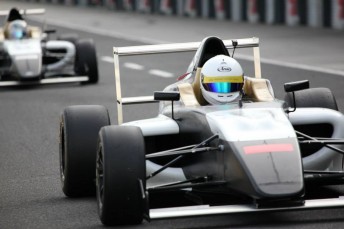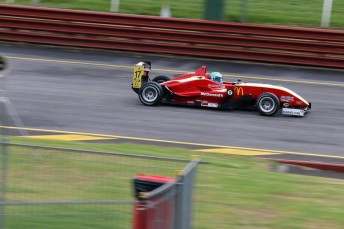

CAMS CEO Eugene Arocca tells Speedcafe.com’s Stefan Bartholomaeus about the Australian Motor Racing Commission’s review into Australian motorsport.
SPEEDCAFE: Eugene, what can you tell us about the AMRC’s Strategic Working Group and the review of the circuit racing landscape that’s currently taking place?
EUGENE AROCCA: To understand it you’ve got to wind back to when we reviewed all of our Commissions.
We’ve got six Commissions across the various disciplines (Motor Racing, Rally, Off Road, Motor Sport Development, Historic Motor Sport and Officials) and we reviewed them all at the end of last year.
We came up with a completely new approach to the Commissions, making them not representative bodies but actually strategic bodies.
When we looked at the AMRC in particular, there was an element that needed to look at regulations and managing certain aspects of the sport, but we felt that there was an opportunity for a high level strategic element.
The AMRC is one Commission that is made up of an element that we call the the strategic think tank and a group who are focussed on the regulations.
The think tank has been charged with a particularly sensitive area of the sport and that is a review of all our categories.
It seems, sitting back to some degree, they (the categories) have sort of been developing by osmosis over a period of time and there was an opportunity to do a proper strategic review of the many categories and championships we have and get this group, who are made up of differing parts of the industry, to come forward with a plan.
It’s then up to the Board to accept what is being recommended by the AMRC and make decisions from there.
That’s a work in progress and we’re hoping to receive a report over the next two or three months in preparation for 2016.
That’s enough time for us to decide at Board level what action we will take and how that’ll be brought out to the rest of the wider community.
We’re not jumping at shadows. It’s part of an evolution for CAMS to become more strategic in the way we do things.
SPEEDCAFE: Is it fair to say that CAMS is aiming to consolidate the number of categories that we currently have running at a national level?
AROCCA: Absolutely. The underlying reason of the review is to rationalise or consolidate.
It’s to say, let’s take a deep breath and look at where the sport should be in five to 10 years.
Let’s plan for the future and be prepared to make courageous decisions if need be about rationalising and consolidating the elements of the sport at the national level.
It represents what we believe will be an important milestone in CAMS’ evolution.
But no one should be spooked or worried. This is all part of the positive evolution of this organisation into one that wants to sit up there with the rest of the major sports in this country and not continue to receive the paltry funding we receive from government which partly reflects their perception of motorsport.
We need to change the way we do things to change that perception.

SPEEDCAFE: You say there’s no need to be spooked, but with the nature of this review, there are plenty who are, particularly in the Formula Ford community. Can you tell us what the vision is for Formula Ford and whether it will continue to be a national series next year?
AROCCA: I can’t pre-empt what these gentlemen are studying and working on at the moment.
But my answer to that is that we’ve been very clear in that we think Formula Ford is a wonderful category. It has been particularly strong at state level.
People need to be reminded that we, CAMS, had to step in and run it for a year (2013) because it had simply run out of money and got to the point where it wasn’t sustainable as a national championship.
We then helped the next group (the Formula Ford Association) by making it a series rather than a championship. So it’s going through an evolution.
Formula Ford will be running around the tracks of Australia for a long, long time, but that doesn’t mean that CAMS shouldn’t focus on what’s being recognised as the global stepping stone.
Despite protestations to the contrary, Formula 4 is presenting itself as an opportunity for CAMS and the rest of the world to create a sustainable, new model for the development of young drivers.
When you develop young drivers and young talent, you develop champions and they then drive the rest of the sport.
So my answer to the question is that Formula Ford will continue to be a significant part of the Australian motorsport landscape, but we’ve been a little bit dismayed and disappointed by what has been a fairly pointed attack at CAMS.
We are wanting to do what we believe is good for the sport. Not for Formula Ford, but for the sport.
If there are people getting spooked or concerned, it’s generally because they’re one element of the sport that are very passionate about that one area of the sport.
We love that passion, but we are the national sporting body that has been charged with making decisions for the good of the sport.
From my point of view, that’s what I’ll always refer back to. We might be judged unfairly, but that comes with the responsibility of being the administration that has to make the decision in the end.
But again, we’ve got a board that makes decisions for the good of the sport. If some people take a negative view of those decisions that’s something we can’t help.
SPEEDCAFE: One aspect that gets brought up quite a bit is that CAMS’ role as category manager for Formula 4 puts it in what could be described as an awkward position to be ruling on the future of Formula Ford.
AROCCA: To be honest, I find that insulting. Every major sport in this country runs certain elements of this sport.
That’d be like saying the AFL can’t run the AFL grand final because it also runs country football.
This nonsense about CAMS not being in a position to run a junior development category specifically tied to its academies, tied to government funding, is just a cheap shot and I’m sick of having to defend ourselves.
It’s almost like saying Cricket Australia shouldn’t have the T20 because it cuts across test cricket.
The difference is of course we’re talking about other elements of the sport that are in some cases being run by commercial operators.
We are not commercial operators. We’re being supported by wonderful sponsors and the money we raise goes back into the sport. It means we can hold more academies and fund more drivers overseas.
I’m amazed that we’re falling for this nonsense to say CAMS can’t run a category. The FIA actually suggested that the ASNs run this important, junior development category.
This is something that we’ve found revenue from alternate sources to support, commercial sponsors who believe in the product who are absolutely comfortable that it’s being run by CAMS.
I shake my head in disbelief that we’re being accused of a conflict of interest when all we’re trying to do is run a category that’s developing young drivers from the age of 15 to become champions.
Our obligations are to promote and grow the sport and if that means running a category from time to time when it relates to kids taking the next stepping stone then I’ll put my hand up every time.
SPEEDCAFE: The fact that other categories, as you say, are being run by commercial entities or at least involve commercial entities (teams) means you surely would have expected backlash from people trying to protect their businesses?
AROCCA: Well gladly the backlash has been minimal. When you’ve got people like V8 Supercars, Tim Edwards and Paul Dumbrell, or Gerhard Berger, David Coulthard and Daniel Ricciardo saying ‘I believe in Formula 4’… what are we missing here?
Again, this is a unique category that is our TAC Cup. In my view, and in that of the Australian Sports Commission, it has been missing for many, many years.
I can only go back to one of my first meetings with the ASC when they said ‘there’s a big gap for the ASC dealing with major sports and the gap is motorsport because we don’t have any great confidence that you’ve actually got a pathway that is supported by the national sporting body that is actually producing results’.
They think it’s been more out of good luck (that we’ve produced champions like Daniel Ricciardo).
When you’ve got government and more sanguine heads around motorsport saying it’s a great thing, even those commercial elements that believe they’re more important than junior development, I’d ask them the question; is this good for Australian motorsport? Absolutely so.
The ASC have been waiting on this development of Formula 4. They’ve been across it all, they’re absolutely supportive of it and that’s what we believe is most important.
When the national sports body that is funding us in part believes what we’re doing is exemplary, then I’m happy to back that.

SPEEDCAFE: Is CAMS going to consider category managing more classes itself, like it’s doing with F4?
AROCCA: We certainly believe we’ve got the obligation to run an important category that is going to promote and grow the sport.
So our focus is on grass roots development and the promotion of talent. We don’t have a desire to run anything other than Formula 4, particularly because it’s an FIA ordained championship and has a world connection. To us that’s doing what we believe should be done.
Again, I can’t comment on the review that’s being done, but I can only act on what I know is the case and at this stage, we’re only interested in running Formula 4. We don’t see any other category at the moment being anywhere near the responsibilities that CAMS has.
But again, I’d ask people to look back in history. CAMS has run categories in the past. We owned 10 percent of V8 Supercars until 1997.
Every other sport, from cricket to soccer, from football to NRL, run and manage all of their commercial operations and TV.
They run and manage all of the participation and spectator related commercial activities, they run their own merchandise and memberships and the money goes back into the sport.
We are the outstanding exception. That’s how it is and that’s life, but the moment we try and do something that’s relevant to developing young talent we get criticised for having a double standard. It’s extraordinary.
SPEEDCAFE: Will there be more funding for motorsport from the ASC once F4 is actually up and running?
AROCCA: We’re certainly going to be pitching to them on that basis. We’ll be saying ‘look at the investment this sport is making that it hasn’t made in the past’.
We certainly believe that it’ll lift our rating among the decision makers at the Australian Sports Commission.
You do need to remember that, unlike the Olympic sports, we’ll always be closer to the bottom of the pool than the top. Particularly with Rio coming up in 2016.
But we’re playing the long game. We know that the ASC is across what we’re doing and continually encouraging us.
We’re going to be making a wide sweeping presentation to them later in the year that we hope will redefine the way they look at motorsport and F4 is an absolutely critical part of that.
SPEEDCAFE: Are you comfortable with the level of competitor uptake for Formula 4 to this point? It’s no secret that you’ve found it difficult to fill the grid.
AROCCA: I understand that this is a long term championship. It is starting in July, rather than March and there was an element of uncertainty until late last year as to whether we were going to do this and the model it was going to take.
I guess to some degree that explains, from what we gather, why the uptake hasn’t been the full grid of 20 cars.
But every bone in my body and every person involved in F4 in this office knows that in 2016 and 17 that we will be growing and growing on the platform of what we’re doing in ’15.
At this stage we are confident of somewhere between 14 and 16 cars on the grid. It’s a new category that is in some regards competing with other elements of the sport.
But what I can say is that it’s on the premiere national calendar and I’m already getting contacted by promoters and tracks for 2016 about when they get the chance to run F4.
We’d love to have more cars, but this is the very first year and it’s a slightly truncated one because it starts in July rather than March.
There’s kids who would jump into our cars but have already committed to other areas because they didn’t want to sit around idle for the first six months.
But every day we talk to more and more karters and we think that will continue to grow momentum over the next two to three years.
Again, this championship will be here long after I’m gone and will continue to thrive and grow. It’s a product that we’re very confident in.

SPEEDCAFE: Without pre-empting the strategic body, we need to talk about F3 as well following the recent decision to remove the Gold Star. The last time we heard something official from CAMS about F3 was that it’s part of the pathway with karts and F4. Is that still how you see F3?
AROCCA: Yes. We’re presenting to the ASC on the basis that it’s an important element in the pathway for international open-wheel status.
The simple fact is that it has struggled in Australia in recent years. Grid numbers have been challenging, but that doesn’t mean that we’re not supportive of F3.
We wouldn’t invest in F4 to the extent that we have without believing that there’s got to be a next stepping stone. Right now it seems to be struggling, which may be a cyclical thing.
With the Gold Star, we made it very clear to F3 Management that unless there was a set number of cars on the grid we wouldn’t continue to award the Gold Star to that championship.
After the first round it was clear we weren’t going to get anywhere near those numbers and therefore we made the announcement about the Gold Star.
But we’d love to see Formula 3 grow. They’re a relevant part of the Australian landscape.
We can’t run Formula 3, that’s a simple reality, but from our point of view we would hope that Formula 3 will find a way.
When we’re told we have to support it, I don’t know what more we can do, other than make it part of the pathway.
SPEEDCAFE: Can you see that removing the Gold Star might actually be viewed as CAMS hurting Formula 3, rather than helping it?
AROCCA: The answer to that is, if it’s been that significant, why haven’t they been able to attract more numbers?
The fact is that while the Gold Star has been awarded to it the numbers have tracked down.
So I’d put the question the other way around and say that the awarding of the Gold Star hasn’t been able to sustain the numbers.
It’s obviously other issues or elements of running the category that are impacting.
We have to balance that against the status of the Gold Star and that status to some degree is dictated by the competitive elements of the particular championship, the number of drivers who are competing and the quality of the drivers.
The Board made the determination that if the numbers didn’t fill the grid, it would impact the status of the Gold Star.
So right now we’re going to park the Gold Star until such time we believe it can be brought back into the motorsport landscape. When that is, I currently can’t answer.





















Discussion about this post